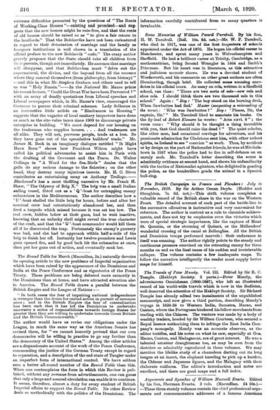The Round Table for March (Macmillan, 5s.) naturally devotes its
opening article to the new problems of Imperial organization which have been raised by the appearance of the Dominions and India at the Peace Conference and as signatories of the Peace Treaty. These problems are being debated more earnestly in the Dominions than at home, and have attracted attention also in America. The Round Table draws a parallel between the British Empire and the League of Nations :- " In both cases the fear of impairing national independence is stronger than the desire for united action in pursuit of common aims : and in the British Empire the fear of centralization has been such that it has led the Dominions to undertake unawares a series of responsibilities towards foreign States far greater than they are willing to undertake towards Great Britain and the British Commonwealth."
The author would have us revise our obligations under the League, in much the same way as the American Senate has revised them, for " we cannot honestly pretend that our own
democracies will be -willing in practice to go any further than the democracy of the United States." Among the other articles are a dispassionate account of the work of the Peace Conference,
commending the justice of the German Treaty except in regard to reparation, and a description of the sad state of Tangier under an imperfect form of international control. We have seldom seen a better all-round number of the Round Table than this.
When one contemplates the form in which this Review is pub- lished, without any revenue from advertisements, one can guess that only a large and assured circulation can enable it to continue. It seems, therefore, almost a duty for every student of British Imperial affairs to support the Round Table. No other Review deals so methodically with the politics of the Dominions. The information carefully contributed from so many quarters is invaluable.










































 Previous page
Previous page